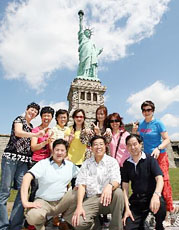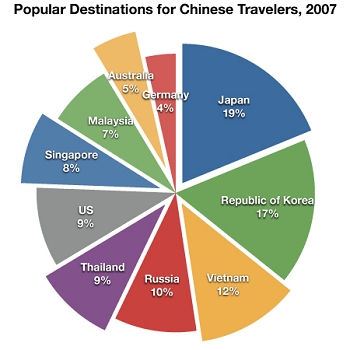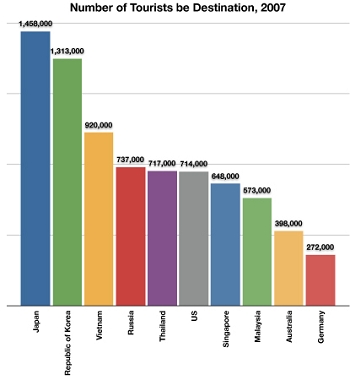China's growing middle class wants to see the world and governments are agreeing to make it easier -- to the delight of the travel industry.
The majority of Chinese travelers are no longer wearing business suits and carrying briefcases. Today, leisure travelers account for 85% of all outbound trips, all looking for foreign attractions and shopping.
Tony Chen is one such tourist. He picked Thailand for his holiday vacation because he was interested in foreign attractions.
"When we were little, people always said to go to Thailand for fun and Thailand is close in proximity to China," Chen said. "Also, we had learned about some things in elementary school, such as the Mangu [Bangkok] elephants, which makes it a unique place to explore."
And in a break with the recent past, the Chinese government is welcoming this trend. Chinese outbound departures more than doubled in the last five years, from 16.6 million people in 2002 to 40.9 million people in 2007. This increase is primarily due to China's sustained economic growth since 1978. The number of affluent Chinese has increased dramatically and many are able and anxious to enjoy to travel. In addition, new international agreements and loosening visa restrictions are making it easier than ever for Chinese citizens to travel abroad.
Chinese outbound departures more than doubled in the last five years, from 16.6 million people in 2002 to 40.9 million people in 2007. This increase is primarily due to China's sustained economic growth since 1978. The number of affluent Chinese has increased dramatically and many are able and anxious to enjoy to travel. In addition, new international agreements and loosening visa restrictions are making it easier than ever for Chinese citizens to travel abroad.
The 2007 Neilsen China Outbound Travel Monitor Report shows that Chinese travelers spend an average of $2,913 per trip per person. Europe is the top dream destination for Chinese travelers, followed by Australia and New Zealand. Although the United States ranks third among the most popular destinations for foreign arrivals overall and sixth in Chinese outbound travel, the number of Chinese leisure travelers to the United States has been tiny. 397,000 Chinese tourists entered the U.S. in 2007, accounting for 0.7% of all inbound tourists according to the U.S. Department of Commerce, making China 16th on the list of international tourism markets to the U.S. In contrast, almost 10,894,000 Western Europeans visited the U.S. last year, and four of these countries are among the top ten suppliers of foreign visitors to the U.S.. Nevertheless, Chinese outbound tourism, including travel to the U.S., is expected to grow 20-30% annually for the rest of the decade.
"Another reason [for the increase in Chinese outbound travel] has been the government's incentive to outbound travel and the increasing liberalization in this area in place since 1983," said Sandra Carvao, deputy chief in the Market Trends and Competitiveness Section of the United Nations World Tourism Organization (UNWTO).

U.S. Pavilion was the biggest one in 2008 WTF(World Travel Fair), Shanghai.
"This includes the raise in the number of holidays, the growing number of ADS [approved destination status] agreements with destinations in all world regions that allow for tourist groups from China to visit those destinations or the Individual Visitors' Scheme allowing a growing number of individual travelers from the mainland to Hong Kong."
Currently, China has granted ADS status to 134 countries, up from only 28 five years ago. The United States is one of the most recently approved countries, taking the 95th spot on the ADS list in 2004.
The latest agreement between the two countries called the Memorandum of Understanding (MOU), was made in late 2007 and took effect in June. The agreement is similar to the ADS agreement, but now allows for group travel. Chinese travel agencies can now market tour packages to destinations in the United States. Moreover, United States companies can now market directly to Chinese citizens.

Source: Bureau of Exit-Entry Administration of the Ministry of Public Security, China 2007.
"This has been a very significant step forward in the development of Chinese tourism to the USA, in particular in the leisure group travel segment," Carvao said. "This will allow a significant jump in the 320,000 [annual] arrivals that the USA receives from China, compared to 2 million in Europe." The U.S. Department of Commerce forecasts that this jump could reach almost 58,000 visitors by 2011. And if the growing annual arrivals from far smaller Hong Kong (over 142,000 in 2007) and Taiwan (over 311,000 in 2007), are any indication of what is to come, future forecasts could be even higher.

Source: Bureau of Exit-Entry Administration of the Ministry of Public Security, China 2007.
The major U.S. cities and tourist destinations are poised to benefit from this new agreement. "We are planning to have a strong presence at this year's China International Travel Mart (CITM) in Shanghai to promote visitation to the Disneyland Resort and Walt Disney World," said John James Nicoletti, the director of external communications for Walt Disney Parks and Resorts. "We also have dedicated a sales director to focus on business out of China."
The city of Los Angeles is also looking to benefit. Though a tourism office for the city has been in Beijing since 2006, business is now increasing. "Our office has been receiving an increasing number of calls, e-mails requesting LA brochures and marketing collaterals from travel agencies and travelers," said Jamie Lee, the regional director for the China office of LA INC., a company that among other things encourages tourism to the city. "Many travel agencies are in preparation for pent-up demand post-Olympics era for the US market."
Regardless of the destination or whether travelers travel in groups or individually, their reasons for travel vary.
"They include in Asia, shopping, and in Europe, mostly culture," Carvao said. "On the other side, business travel has also increased exponentially, in a significant part induced by the strong economic performance of China and its increased presence and exchanges in the world economy."
Leah Liu, a Shanghai resident, says that she loves to travel for the sense of adventure and scene.
"The main reason for traveling overseas is holiday vacations and being able to experience different cultures and opening my horizons," Liu said. "I've been to some Southeast Asian countries, like Thailand, Indonesia, Malaysia, Singapore, Nepal; European countries like UK, Germany, Hollan
Previous: Brazil Set Up a Brazilian House in Beijing to Promote Tourism
Next: Australia:New South Wales new plans to woo Chinese tourists